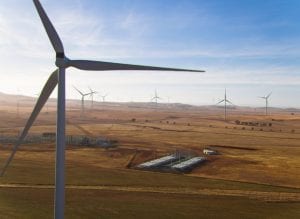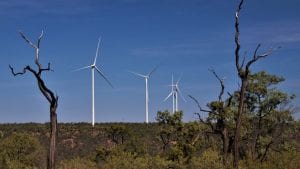One of the world’s banking giants has found that climate resilient investment options are outperforming the rest of the market, successfully bucking the disruptions caused by Covid-19.
In a new analysis published by HSBC Global Research, the bank found that its sustainable investment options, particularly those with reduced contributions to climate change, had significantly outperformed the market during 2020, despite severe economic disruptions.
An HSBC index of ‘climate Stocks’ has outperformed the global equity market by 5.1 per cent since December, and a separate ‘High ESG-rating’ index has outperformed the global market by 3.7 per cent.
To be included in the HSBC climate solutions index, companies must source at least 10 per cent of their revenues from climate solutions, as well as having a minimum market capitalisation of US$500 million.
These “climate solutions” can include direct investments in clean energy technologies such as wind and solar, carbon trading and climate financing, as well as sustainable agricultural practises and investments in energy efficiency projects.
High ESG stocks (which concerns Environmental, Social, and Governance), generally include companies that demonstrate stronger corporate social responsibility, and generally more considerate of issues like climate impacts, human rights obligations and working conditions.
According to the HSBC analysis, companies that exhibit strong adherence to these principles, and those actively working to reduce their contributions to climate change, have been more resilient to the economic shock caused by Covid-19 lockdowns.
Global stock markets were slammed in response to the impacts of widescale lockdowns on the global economy, but HSBC found that during the period of initial disruption, throughout February and March, climate friendly stocks at outperformed the market, showing greater resilience to the initial disruption.
Updating its assessment, HSBC found that these stocks continued to outperform the market throughout April, as companies began to settle into a “new normal.”
HSBC said that this trend was true across almost all global regions, and was particularly strong in the Asia-Pacific region, which saw the climate-friendly index outperform the wider market by almost 15 per cent. In Europe, the performance gains were in the region of 7 per cent.
The only region where the climate index underperformed was the American region, which has been impacted by a sporadic and unpredictable response to the Covid-19 outbreak from president Donald Trump.
In particular, amid the disruption of the Covid-19 outbreak, the global gas and oil sectors have been thrown into chaos, with a drop in global demand combining with an international price war working to send oil prices plummeting.
With a massive glut in oil supplies, prices in some markets, including the United States, fell to negative levels, as producers looked to offload oil into a market where storages had already reached capacity.
The outcome sheds new light on the value of sustainable investment strategies.
Generally, sustainable investments have been developed with a long-term investment view, looking to maximise returns over the space of decades, while potentially limiting short-term returns that can be achieved in profitable, but environmentally damaging industries, like the fossil fuel sector.
Looking back to 2007, HSBC Global Research found that its climate-friendly investment options had also outperformed investment benchmarks, beating the market by more than 66 per cent.
But the latest analysis has suggested that climate-friendly investment options can also shield investors from sudden, short-term, economic impacts.
“Our long-held, core ESG conviction is the simple idea that issuers succeed long-term, and hence deliver shareholder returns, when they create value for all stakeholders – employees, customers, suppliers, the environment and wider society,” HSBC Global Research says in its new analysis.
“When crises manifest, particularly with social and environmental causes and implications, as with COVID-19 and (arguably and partially) oil price dynamics, then we believe this idea is ascribed greater weighting by investors, who view ESG as a defensive characteristic.”
“Investors should instead use ESG analysis to consider whether estimated earnings growth levels are still realistic, what does increasing volatility mean and should risk premia be altered, how companies have used earnings, and what are the trough multiples from previous crises. This is the pathway towards deeper integration of sustainability factors into investment management.”
There has been a surge in major international investment managers dumping investments in the fossil fuel industry, seeing the sector as representing an unsustainable risk to financial returns, as well being an unsustainable contributor to global warming.
In January, the world’s largest private investor, BlackRock, announced that it was pulling its investments out of the thermal coal industry. It was a landmark decision for an investment manager that not only controls around A$10 trillion in assets, but also one that sets a standard for the rest of the investment industry.
RenewEconomy and the Smart Energy Council will be co-hosting a “virtual conference” on May 6, focusing on a renewables-led economic recovery, featuring industry leaders, analysts and advocates. More information and registration here.
RenewEconomy and its sister sites One Step Off The Grid and The Driven will continue to publish throughout the Covid-19 crisis, posting good news about technology and project development, and holding government, regulators and business to account. But as the conference market evaporates, and some advertisers pull in their budgets, readers can help by making a voluntary donation here to help ensure we can continue to offer the service free of charge and to as wide an audience as possible. Thankyou for your support.









